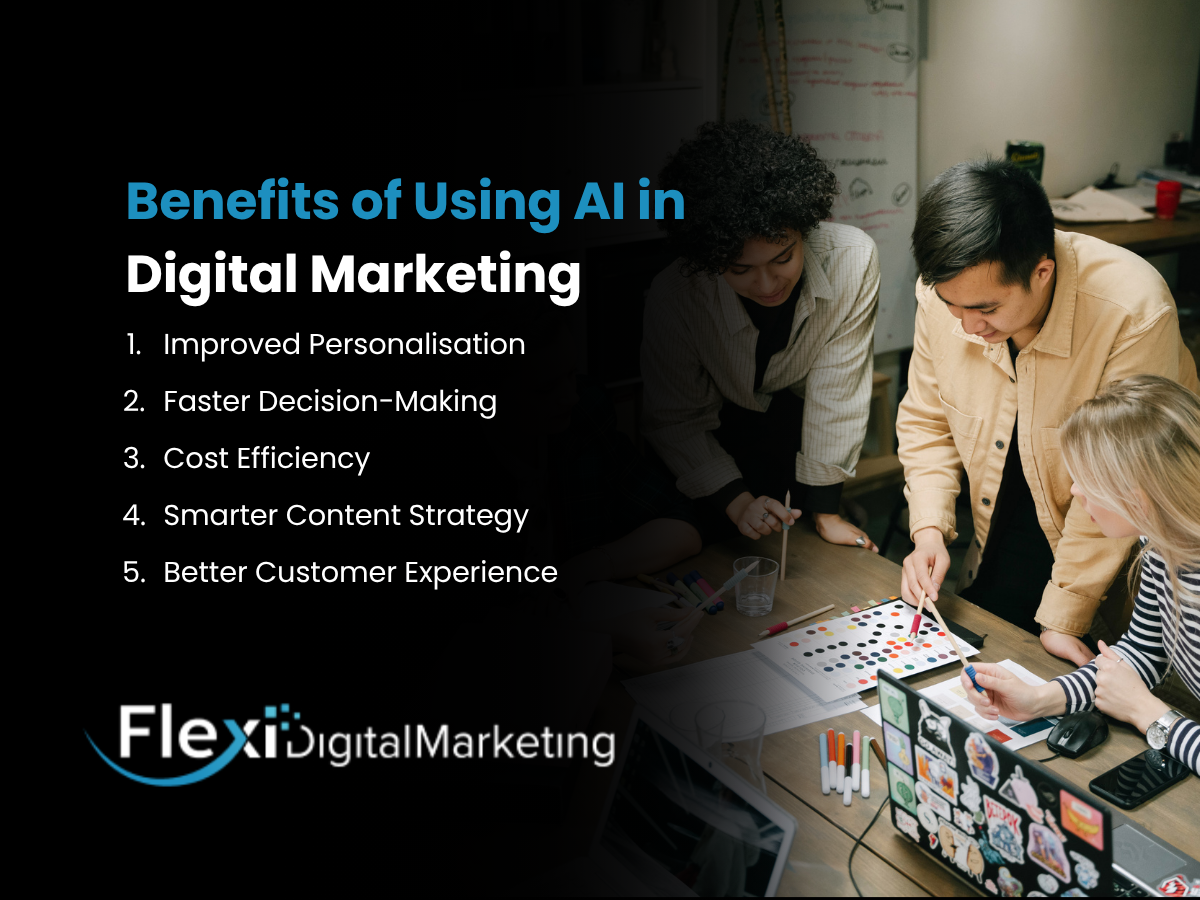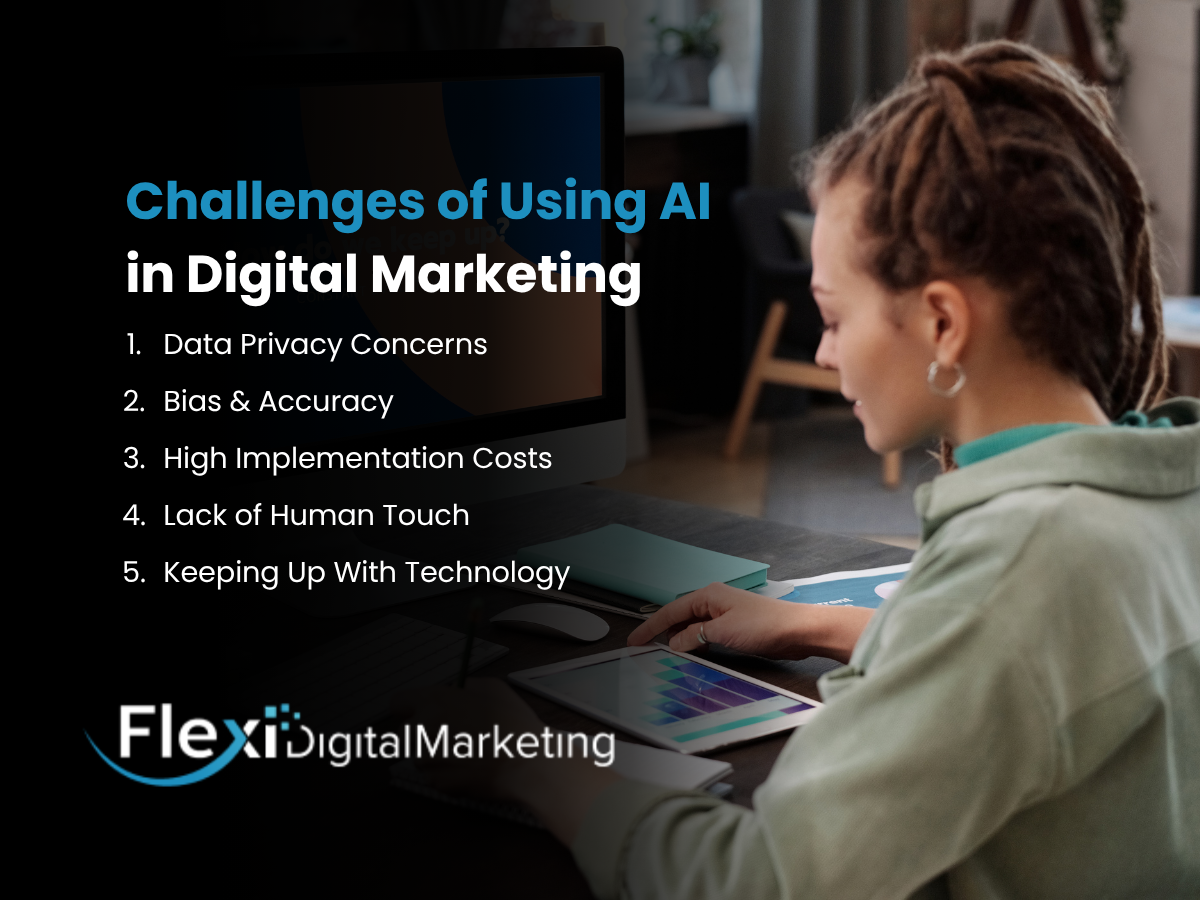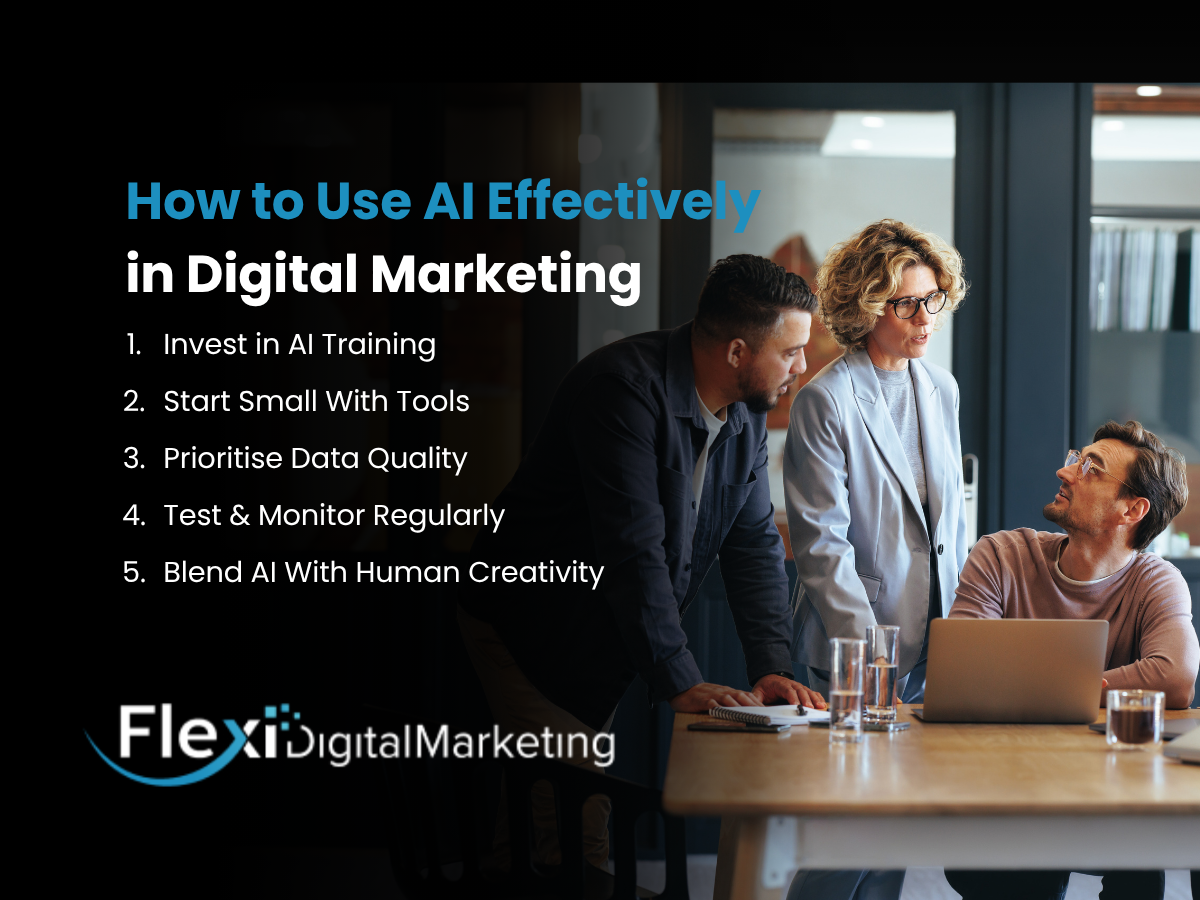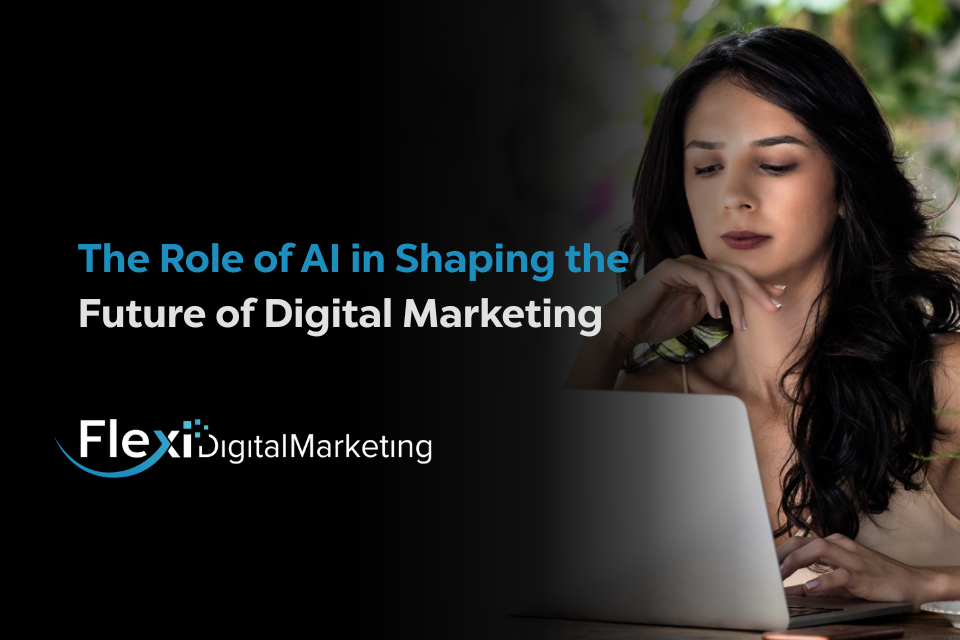Artificial intelligence is transforming how brands understand and engage with customers. It supports more efficient targeting, personalised experiences and smarter decision-making. Businesses that embrace AI now can gain a serious edge in the digital space.
This blog explains how AI works across different areas of digital marketing. You will find out what benefits it brings, what challenges to expect and how to get ready for an AI-powered future. Keep reading to learn how AI is shaping the direction of modern marketing.
What Is AI in Digital Marketing?
AI in digital marketing refers to using smart technologies that can analyse data, learn from patterns and make decisions without manual input. It powers tools like chatbots, recommendation engines and automated ad targeting. These systems help brands better understand and respond to customer behaviour.
AI works behind the scenes through machine learning, natural language processing and predictive analytics. These tools make it easier to deliver relevant content, improve customer service and optimise campaigns. Marketers use them to stay more connected with their audiences across channels.
Why AI Matters in Digital Marketing
AI helps marketers handle large amounts of customer data with speed and accuracy. It finds insights that would take humans much longer to identify. This means brands can act faster and deliver more relevant experiences.
Consumer expectations have changed and people want content that feels tailored to them. AI supports this by analysing preferences, habits and interests in real time. With these insights, businesses can craft messages that speak directly to their audience.
The digital space is more competitive than ever and attention spans are short. AI tools allow marketers to test, measure and improve campaigns without wasting time. That level of efficiency is critical to success and long-term growth.
Key Applications of AI in Digital Marketing
AI helps digital marketers work faster, smarter, and more accurately. It takes large amounts of data and turns them into useful actions. It also helps businesses understand their customers, create better content, and improve results.
Here are 10 ways AI is used in digital marketing:
- Content Creation: AI tools help write blog posts, product details, ads, and social media captions. They save time and keep content aligned with the brand’s tone and style.
- Email Marketing: AI chooses the best time to send emails, writes subject lines, and suggests content based on each person’s interests. This improves open and click rates.
- Ad Targeting: AI tracks user behaviour and places ads where they’ll perform best. It helps save budget and reach the right audience.
- Chatbots & Customer Support: AI chatbots give instant replies to common questions. They work 24/7 and pass complex issues to human agents when needed.
- Search Engine Optimisation (SEO): AI tools suggest keywords, fix content gaps, and help boost rankings. This makes it easier for users to find your website.
- Predictive Analytics: AI studies past data to predict what customers might do next. This helps plan better offers, content, and marketing strategies.
- Social Media Scheduling: AI tools write posts, choose the best posting times, and track what performs well. It makes managing social media simpler.
- Personalised Recommendations: AI shows users the most relevant products, services, or content. This is based on what they’ve viewed or purchased before.
- Image & Video Recognition: AI scans visuals to support virtual try-ons or find similar items. This boosts user experience and engagement.
- Voice Search Optimisation: AI helps tailor content to how people speak when using voice assistants. This includes giving answers in a more natural way.
AI is changing how digital marketing works. These tools help brands reach the right people, at the right time, with the right message—all while saving time and effort.
Benefits of Using AI in Digital Marketing
AI helps marketers reach the right people at the right time. It automates repetitive tasks so teams can focus on strategy and creativity.

1. Improved Personalisation
AI helps brands tailor messages based on user interests, past actions and location. This leads to more relevant offers and a better customer journey. Personalisation increases engagement and drives higher conversions. It also builds trust by showing users that their needs are understood.
2. Faster Decision-Making
Marketers can use AI to gather insights and respond to trends as they happen. This speed gives them a real advantage in planning and launching campaigns. AI removes guesswork by highlighting what works best. As a result, businesses make more confident and informed decisions.
3. Cost Efficiency
AI cuts costs by reducing manual work, improving targeting and lowering ad spend. It also helps teams focus their efforts where they matter most. By automating repetitive tasks, brands save time and money. This allows smaller teams to deliver high-quality results.
4. Smarter Content Strategy
AI tools can suggest what type of content will perform best based on past data. They also help track how users respond across platforms. With this feedback, marketers can adjust their content quickly. That means more views, more clicks and better brand visibility.
5. Better Customer Experience
AI creates seamless, helpful interactions through chatbots, personalised emails and dynamic website content. Customers get answers quickly and find what they need faster. This keeps users satisfied and increases brand loyalty. A smooth experience can turn visitors into lifelong customers.
Challenges of Using AI in Digital Marketing
AI brings many benefits to digital marketing, but it also comes with its own set of challenges. Understanding these obstacles is key for marketers to use AI responsibly and effectively.

1. Data Privacy Concerns
AI needs large amounts of data to work properly, which raises concerns about how information is collected and stored. Customers expect transparency and protection. Marketers must follow data laws and gain user trust. Poor handling of data can lead to legal trouble and lost credibility.
2. Bias & Accuracy
If AI is trained on biased data, its decisions can be flawed. This may lead to targeting the wrong audience or spreading misinformation. Brands need to regularly check and improve their AI models. Accuracy should always be a top priority.
3. High Implementation Costs
Advanced AI systems can be expensive to build or buy. Smaller businesses may struggle to invest early on. However, there are affordable tools that offer basic AI functions. Marketers should weigh the long-term value against the upfront costs.
4. Lack of Human Touch
Automated messages can feel cold or impersonal if not done right. AI is fast, but it still needs human input to guide tone and creativity. Customers value authentic communication. A balanced mix of automation and personal effort works best.
5. Keeping Up With Technology
AI evolves quickly and tools change often. Marketers need to keep learning and adjusting their strategies. Falling behind can make brands less competitive. Training and adaptation are key to making AI work effectively.
How to Use AI Effectively in Digital Marketing
AI can help make digital marketing smarter and easier. To get the best results, it’s important to learn how to use AI tools well and keep improving along the way.

1. Invest in AI Training
Teams need to understand how AI tools work and how to use them. Training helps marketers apply these tools in a way that supports business goals. It also boosts confidence and innovation. Learning is the first step towards smart AI adoption.
2. Start Small With Tools
Use simple AI-powered platforms for emails, ads or analytics. These tools are easier to manage and often have a fast return on investment. Once the team is comfortable, you can explore more advanced features. This helps build a strong foundation.
3. Prioritise Data Quality
Good data is the backbone of any AI system. Make sure your customer information is clean, accurate and up to date. This improves results and avoids missteps in campaigns. The better the data, the better the outcome.
4. Test & Monitor Regularly
Always track how AI performs across marketing channels. This ensures the tools are helping rather than hurting the strategy. Use feedback and analytics to make ongoing improvements. Constant testing keeps campaigns fresh and relevant.
5. Blend AI With Human Creativity
Use AI to support your team, not replace it. Let it handle the data-heavy tasks while humans focus on big ideas and emotional storytelling. This combination delivers the best of both worlds. Brands that balance tech and creativity will stand out.
Final Thoughts
AI is reshaping digital marketing in a lasting way. From marketing automation to advanced analytics, AI-driven digital marketing solutions help brands connect with customers in smarter and more personalised ways. Early adopters of AI gain a clear advantage, while those who hesitate risk losing ground quickly.
A strong understanding of AI’s benefits and challenges equips marketers to make strategic decisions. AI unlocks valuable insights, streamlines processes, and helps build customer trust. Using it thoughtfully, creatively, and consistently is essential to elevate digital marketing to new levels of success.
Ready to take your marketing to the next level with AI? Contact us today and let’s make it work for your business.


